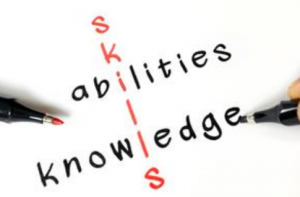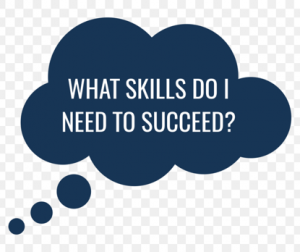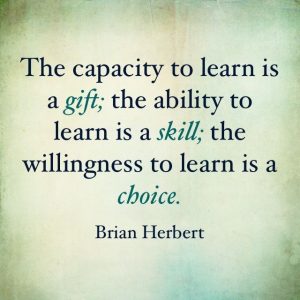Competencies are Developed
Competencies are Built in a Lot of Different Places & in Different Ways
There are a lot of doors to go through to find opportunities to build competencies. There are lots of settings in which you can develop competencies. School offers a lot of doors to go through, but there are many others – yes, including at home. In fact, when you look at all the opportunities, all those opportunities are kind of overwhelming – in a good way.

The Two Central Questions to Ask
- “What can I Learn in These Different Settings?”
Whatever setting you happen to be in, you can always see how many competencies you might be able to develop. Some competencies may not be obvious right away, so ask the question. - “If I Have an Experience (a class, a trip, volunteer assignment or job, team, club, etc.), What Competencies Could I Build?”
You can have an experience and get some benefit out of it, but you can have the same experience and get a lot of benefits out of it, if you are intentional about it. Ask the question.
Sometimes the answers to these questions are easy, but sometimes it takes some work and exploration to find where to learn a particular skill. For example, it might be easy to find where to learn how to create a budget or use a bank account, but difficult to find where to learn relationship competencies like active listening or empathy.
The internet has changed the game, however, so a stunning number of competencies can be developed through good resources on the net.

The Amazing Range of Opportunities for Developing Competencies
The following settings all offer potential opportunities to build competencies. There are a lot of doors with opportunities behind them. Each setting has examples of the competencies you can develop there, but they are just examples. Don’t be limited by them.
Some Good News. You can learn the same competency in several settings and it is good to have that kind of reinforcement. For example, problem solving, communications, self-management and time management are all part of many of these settings.
School
You can develop an extraordinary range of competencies in school. Or you can miss most of those opportunities. The difference is in how you approach school.
- You can approach it as a place full of opportunities to develop a wide range of competencies.
- You can approach school as something to get through with the least hassle possible.
- You can also approach it as a place to learn academic knowledge and miss the rest.
Make School Work for You
The key is to very intentionally look to see what skills you can learn in any school setting. School might not be your favorite thing and your school might be quite varied in teaching/coaching quality, but the opportunities are there.
- Classes
- Clubs
- Athletics
- Performing arts
- Being a peer mentor
- Volunteering
The Competencies You Can Develop in School are Impressive
It’s a matter of focusing on what competencies you can develop in which settings at school.
- How to deal with difficult people
- How to manage your emotions
- Communicating with others (written, verbal, digital)
- Planning and organizing
- Time management
- Understanding people different from you
- Conflict resolution
- Problem solving
- Physical competencies
- Leadership
- Study habits
- Analysis
- Stress management and resilience
- Decision making
- Creativity
- Accountability
The Internet
This is a huge resource. Check out what’s available for any topic of interest.
- Use your common sense to determine which sites are credible
- Ask others you trust for credible sites
- Create your own library of sites that you can return to (most competencies require time and practice)
Paid Jobs or Volunteer Jobs
Many volunteer jobs offer as many or more opportunities to develop competencies as paid jobs. As with schools, make any job work for you by approaching it with the intent to learn as many competencies as you can.
- Specific skills and knowledge required for the job
- How to deal with a boss
- How to work with co-workers
- How to supervise others
- Communications kills
- Time management skills
- Conflict resolution
- Problem solving
- Planning & organizing
- Budgeting
Community/Social Action Groups
You can learn a lot, and also do good, by being involved with community groups. You don’t need a large role if you pay attention to the opportunities to learn.
- Influencing others
- Advocacy for causes
- Planning
- Organizing
- Communications
- Problem solving
- Relating to others that are different from you
- Communications
Whether you think you can or think you can’t - you are right.
Henry
Ford
Family or Extended Family
Whether your family is healthy or dysfunctional, you have the opportunity to learn or practice a lot of skills in the family setting. Different families offer different competencies, often based on the competencies of the adults and their willing ness to teach them. Take advantage.
- Negotiation -reaching agreement on issues
- Conflict management
- Communications
- Managing your health
- Collaboration
- Managing emotions
- Cooking
- Cleaning
- Laundry
- Budgeting and managing money
- Driving a vehicle
- Hobbies other members can teach you
- Skilled trades
Community/Social Action Groups
You can learn a lot, and also do good, by being involved with community groups. You don’t need a large role if you pay attention to the opportunities to learn.
- Influencing others
- Advocacy for causes
- Planning
- Organizing
- Communications
- Problem solving
- Relating to others that are different from you
- Communications
Youth Groups
Youth groups can offer a lot of opportunities to build competencies, particularly relationship and leadership competencies. Many also offer the opportunity to build specific competencies in other categories. They are also good for simply connecting with others and having fun. Many have a service focus to help make a difference.
Some of the key relationship competencies include:
- Active listening
- Sharing yourself with others
- Problem solving
- Relating to and appreciating people who are different
- Collaborating with others
- Supporting others and getting support
Courage is the commitment to begin without any guarantee of success
Johann Wolfgang Von
Goethe
Faith Communities
Faith communities can not only guide the exploration and development of your faith, they often also provide many of the opportunities found in youth groups and community/social action groups. You can get more involved in your family’s faith community and you can explore other faith communities.
Libraries
Good libraries have an amazing array of resources and the good ones can help you navigate them – including the internet.
Be curious always. For knowledge will not acquire you. You must acquire it.
Unknown
Camps
There are camps for all kinds of experiences. They vary in length and expense as well as focus. For example:
- Adventure camps
- Camps focused on certain sports or arts
- Service trips/camps
- Camps sponsored by faith communities
- Leadership camps
- Etc.
Just start exploring on the internet, asking friends, school personnel, etc.
Colleges
Some colleges and community colleges offer pretty extensive adult education courses that you can take and some offer programs for high school students. As with camps, you can just start exploring to see what’s out there in your community.
